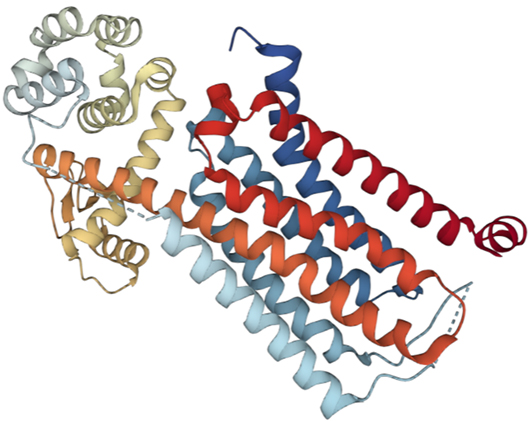

Our Science
mGluR5 NAM Program

Reference: PDB ID: 5CGD
CNS diseases are another area of research interest at our company. The metabotropic glutamate receptor subtype 5 (mGluR5) belongs to the family of Class C, G protein-coupled receptors (GPCR) which have historically been regarded as poorly druggable. mGluR5 is highly expressed in specific regions of the brain and has in recent years emerged as an exciting potential drug target for several CNS disorders including Parkinson's disease (PD) associated dyskinesia, depression, anxiety, fragile X syndrome (FXS), and drug abuse.
Classically, most marketed drugs are designed to directly bind at a specific protein’s active site, having to essentially compete against the endogenous ligand’s binding to show an effect. By contrast, drugs that are allosteric modulators are non-competitive because they bind proteins at a different area than the endogenous ligand’s binding site, yet are still able to affect its activity. Hence, allosteric modulators are not limited to simply turning the activity of a target protein “on” or “off” in a binary fashion. Instead, they can act more like dimmer switches, offering improved control over the intensity of activation or deactivation, while still allowing the body to retain control over initiating natural protein function. Finally, allosteric modulators are a class of orally-available, small molecule therapeutic agents that may offer a competitive advantage when targeting poorly druggable protein targets like mGluR5.

Our portfolio of novel mGluR5 allosteric modulators have demonstrated excellent potency, selectivity and preclinical efficacy profiles. They may offer a transformative new mechanism of action with the potential to become best-in-class drugs in a variety of CNS disorders in which mGluR5 dysfunction has been implicated in the pathogenesis.















